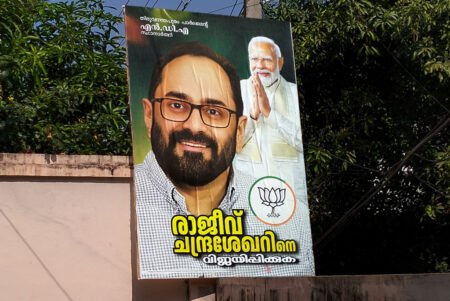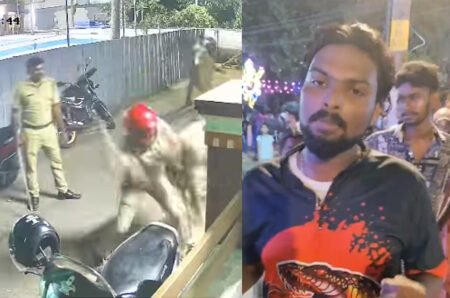The Udayakumar custodial death case unfolded in the Indian state of Kerala in 2005, sparking national outrage and a widespread demand for justice. Udayakumar, a resident of Thiruvananthapuram City, was taken into police custody under suspicion of minor theft due to possessing ₹4,500 in cash.
The two police officers, K. Jithukumar and S. V. Sreekumar are alleged to have inflicted severe torture on Udayakumar in an attempt to extract a confession, eventually leading to his death. This shocking incident shook the conscience of the nation, leading to a sustained public outcry against police brutality and the misuse of power. The relentless legal battle led by Udayakumar’s mother, Parvathy Amma, further fueled the general sentiment as she sought justice for her son’s untimely death. This high-profile case has opened up broader discussions on the need for police reforms and the protection of human rights in India.
The CBI Special Court’s decision was founded on the grievous nature of the crime, the misuse of authority by the police officers, and the resultant social harm. Judge Nazar emphasized that law enforcers are intended to be protectors of life and property, not “death dealers.” He censured Jithukumar and Sreekumar for having taken the life of an innocent man in their custody. The crime was categorized as being in the ‘rarest of the rare’ category, a classification that warrants the death penalty under the Indian judicial system. Judge Nazar stressed that the unlawful actions of the police officers had significantly eroded public trust in law enforcement and caused extensive social damage. This harsh sentence serves as a stark reminder to law enforcement agencies about the inviolability of human rights and the catastrophic repercussions of their breach.
The ripple effect of the Udayakumar case extended beyond the two primary convicts, touching other critical players in the law enforcement system: retired S.P.s T.K. Haridas and E.K. Sabu, along with Dy. S.P. Ajith Kumar was also implicated in the post-crime cover-up. Charged with tampering with evidence and falsification of police station records, the court duly sentenced them to three years in prison, thereby making a clear statement that any dereliction of duty, no matter how high up in the ranks, would not go unpunished.
However, granting bail to these officers stirred up questions about the adequacy of the punishment. This continues to fuel debates about the stringent need for accountability in the law enforcement system and the importance of punishing those who misuse their authority, regardless of rank.
The case also saw some police personnel playing a crucial role in upholding justice. The testimony of three women constables, officers on sentry duty, and those in charge of the State General Diary proved pivotal. These officers witnessed Udayakumar’s weakened condition after encountering the accused, directly corroborating the prosecution’s case. Their stand underlines the importance of moral courage within the law enforcement system, asserting officers’ need to prioritize truth and justice, even when it implicates their colleagues.
The Udayakumar case ignited a wave of widespread public condemnation of police brutality in India, fueled by media coverage and the emotionally charged pleas of Udayakumar’s mother, Parvathy Amma. The media played a pivotal role in shedding light on the gruesome details of the torture that Udayakumar underwent at the hands of the police officers. The graphic and relentless portrayal of police brutality stirred the public’s conscience, leading to protests and a nationwide demand for justice. The media’s role went beyond mere reporting, influencing public opinion, and pressuring the authorities to investigate the case thoroughly.
Parvathy Amma’s heartbreaking pleas for justice for her son resonated with millions across the nation. Her despair and determination were instrumental in keeping Udayakumar’s story alive, and her relentless pursuit of justice came to symbolize the fight against police brutality in India. Her statements, filled with a mother’s grief and resolve, served as a constant reminder of the human lives impacted by such inhumane acts. Her courage and resilience became a beacon of hope for other victims of such atrocities, emphasizing the necessity to resist and fight against such grave injustices.
The Udayakumar case is likely to have profound implications on police practices, public trust, and the Central Bureau of Investigation’s (CBI) future endeavors. The severe punishment handed down to the offending officers and their superiors sends a clear message to law enforcement agencies about the grave consequences of misuse of power and violation of human rights. This case’s outcome is expected to prompt introspection within the police force and stimulate earnest endeavors toward police reforms, with an increased emphasis on transparency, accountability, and respect for human rights.
The public trust in law enforcement, severely eroded by this incident, may gradually rebuild as the justice served reiterates the tenet that nobody is above the law – not even those entrusted to enforce it. It reassures the public that the judicial system can hold even its enforcers accountable.
This legal victory for the CBI, who effectively built and presented the case against the accused, enhances its credibility. It bolsters the public’s confidence in the CBI’s ability to conduct impartial investigations, even in cases involving law enforcement officials. This success paves the way for the CBI to drive more robust investigations in the future, further reinforcing its critical role within the Indian justice system.











